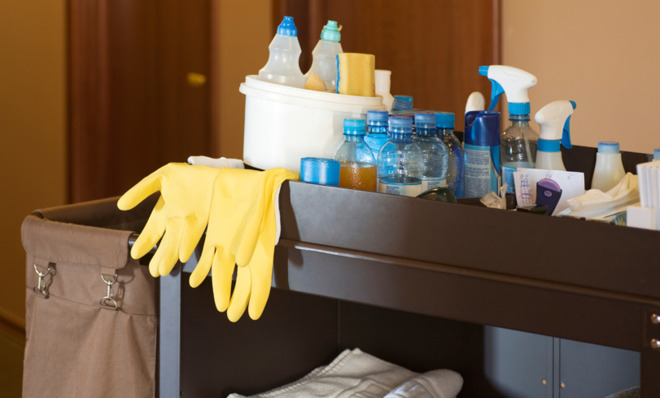Why everyone got upset about Marriott's plan to increase housekeepers' pay
And the award for worst PR backfire goes to...


A free daily email with the biggest news stories of the day – and the best features from TheWeek.com
You are now subscribed
Your newsletter sign-up was successful
In an attempt to bolster the wages of hotel housekeepers, Marriott International has partnered with Maria Shriver's A Woman's Nation to launch a new tipping initiative. They're calling it "The Envelope Please" (because cleaning rooms has so much in common with winning an Oscar) and it will create a designated area for leaving gratuity in 160,000 rooms in the U.S. The conceit is that this will encourage hotel guests to tip housekeepers.
And boy, did Marriott ever step in it.
What the company failed to realize is that we're in the midst of a simmering national conversation around tipping — with much of the internet coming down firmly on the side of "tipping is terrible."
The Week
Escape your echo chamber. Get the facts behind the news, plus analysis from multiple perspectives.

Sign up for The Week's Free Newsletters
From our morning news briefing to a weekly Good News Newsletter, get the best of The Week delivered directly to your inbox.
From our morning news briefing to a weekly Good News Newsletter, get the best of The Week delivered directly to your inbox.
Firing one of the first shots, Brian Palmer wrote in Slate last year:
Tipping is a repugnant custom. It's bad for consumers and terrible for workers. It perpetuates racism. Tipping isn't even good for restaurants, because the legal morass surrounding gratuities results in scores of expensive lawsuits. [Slate]
It's this point that was made again and again in articles and forums. Even Hillary Clinton alluded to the debate this past Friday when she called attention to fact that tipped work is often done by women. (Indeed, a study from 2010 found that women make up 66 percent of tipped workers.)
Tipping is also by nature unreliable. Palmer points to a study showing that there is often little correlation between tip size and quality of service. Individuals and different communities also have their own ideas about tipping that is independent of the way they are treated.
A conversation on the Marriott Rewards Insiders discussion board about the new initiative illustrates this point perfectly. Some are enthusiastic about the idea, while others are already highly dismissive of it. It doesn't take much to imagine that these attitudes will be reflected in the way guests fill those envelopes, especially since a hotel by nature attracts people from all different cultures and customs.
A free daily email with the biggest news stories of the day – and the best features from TheWeek.com
And so while Marriott's initiative might help "these women feel seen and validated," as Shriver suggests in the press release, it isn't going to pave the path to a secure, middle-class existence or pay for all their chronic back pain.
Here are three salient facts:
1. The mean annual wage for housekeepers and maids was $22,130 in 2012, according to the U.S. Bureau of Labor Statistics.
2. In recent years, corporate chains like Marriott have increased the number of rooms a housekeeper must clean in a day, and many must skip breaks or meals in order to fulfill their quota.
3. A recent study of hotel housekeepers found that 91 percent have suffered work-related pain, and 66 percent took pain medication just to get through their daily quota.
"Room attendants are the largest employee group within Marriott International and the heart of the house. We are proud to offer opportunities for job growth, strong training programs, and competitive wages and benefit packages," says Marriott's $7-million-dollar man, CEO Arne Sorenson, in a press release.
But how much do you really value them, and for that matter, how competitive are their wages, when you are asking guests to contribute? This is a multi-national organization, after all, with $13 billion in revenue last year, including $626 million in profits. Surely it would be better to offer them a piece of that and reduce their workload. If we were talking about my heart here, I would treat it better myself.
Elissa Strauss writes about the intersection of gender and culture for TheWeek.com. She also writes regularly for Elle.com and the Jewish Daily Forward, where she is a weekly columnist.
-
 How the FCC’s ‘equal time’ rule works
How the FCC’s ‘equal time’ rule worksIn the Spotlight The law is at the heart of the Colbert-CBS conflict
-
 What is the endgame in the DHS shutdown?
What is the endgame in the DHS shutdown?Today’s Big Question Democrats want to rein in ICE’s immigration crackdown
-
 ‘Poor time management isn’t just an inconvenience’
‘Poor time management isn’t just an inconvenience’Instant Opinion Opinion, comment and editorials of the day
